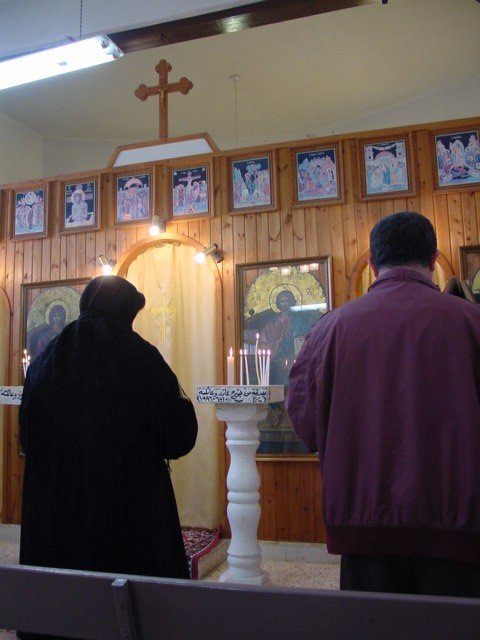December 13, 2002
Our guests, Carl and Sue Johnson, have been spending some time at Ibillin working on a new book about Mar Elias College. Part of the story will be to set it in context, and so their visit to us (along with being a visit among friends and fellow EMEU board members) is to help do that. They also do many State-side talks in congregations about the situation facing Palestinian Christians, and so this visit is to tell a bit of the story in the northern West Bank.
Orthodox worship in Tubas, Palestine.
We left early for Tubas, to the south of Zababdeh, with Fr. Thomas. Fortunately, it was open - one never knows these days - and we were able to attend worship with the Orthodox Church of the Holy Trinity there. It was the first time in anyone's memory that foreigners came to visit them (other than us) and to ask them about their situation. Unlike nearby Burqin (which has an historical church) and Zababdeh (which has a Christian majority), Tubas is often bypassed by Christian pilgrims - even those coming on solidarity tours. To have two foreigners asking about the situation affecting the community of some 60 people was quite meaningful.
After fellowship and coffee, we were taken on a tour of the area, heading south on the road towards Nablus. We passed by the old British-Israeli prison, now being turned into a youth center, opposite Farah Refugee Camp. It, like the rest of the West Bank's camps, remains a place of squalor, if a bit more permanent in appearance than the name "camp" might convey - fifty years is a long time.
The natural springs of Beidan have offered retreat - when the roads are open.
We arrived in the town of Beidan, which lies right on a wonderful natural spring. The area around is green and lush, and elegantly-decorated restaurants line the road. Unfortunately, most of them are empty - the one that remained open tried to coax us inside. It was the first time Marthame had stopped here and saw what once was a West Bank playground - water slides, swimming pools, and outdoor restaurants line the stream that springs forth from Beidan.
Fr. Thomas looks out over the valley between Tubas and Nablus.
We continued on the road until reaching as far as we could go, where the road has been bulldozed once again. Each time, the road is destroyed a bit further down. It remains unpassable by car, and gets longer and more difficult for passage by foot. It would now take an hour to walk from this point to the edge of Nablus. Nablus, it seems, is the forgotten tragedy of this place. It is cut off from the world, cut off from the West Bank, even cut off from itself - residents of that city now need permits to go from one part of town to the other, and the area in front of the old Municipality building has been sealed off with a metal gate. We had been hoping to go down to visit our friends there, but right now doesn't seem like the time - perhaps that may make it the most important time to go.
In the evening, we stopped by the Latin Convent to visit with Fr. Aktham and Deacon Homam. Fr. Aktham shared with us some highlights of the pageant, as well as a few surprises he has up his sleeve for the Christmas Eve service. It looks like the time away on the Patriarchate's clergy retreat has given him a good recharge and the chance to let his creativity take shape. He was also able to share with the Johnsons some of the realities of life these days. Particularly of interest was the situation regarding law and order. After the recent shooting of the owner of one of Zababdeh's liquor stores, the Palestinian Authority was able to investigate - by telephone, mostly - and discover who the perpetrators were. Their names are sitting in an office file in Ramallah, waiting for the roads to open so arrests can take place. Zababdeh is not alone - there are murders, thefts, and other crimes with a similar status throughout the West Bank.
However, social order has not broken down. The close-knit nature of society here, with mostly small towns and strong family allegiances keeps a kind of peace. We wonder at this, considering where we came from: what would happen in Chicago or Atlanta or even Lubbock if there were suddenly no police? It gives us the shudders, and gives us an appreciation for our host culture.
We then stopped by to meet with Deacon Firas briefly on the eve of his becoming a priest - he is busy with last minute plans, so a quick cup of tea was all we had time for.



